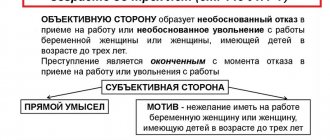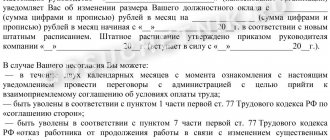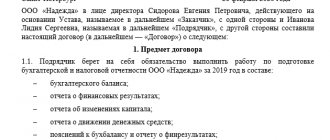Article 61 of the Labor Code of the Russian Federation defines the procedure and timing for the entry into force of an employment contract.
In general, the date of entry into force of any contract, including an employment contract, is considered to be the date of its signing by the counterparties.
Exceptions are cases when there is a condition for the delayed entry into force of the agreement or when the terms for the entry into force of the agreement are expressly established by law. Art. itself 61, as well as the entire Labor Code in general, do not in any way determine the time frame for signing the TD by each of the counterparties. Labor Code of the Russian Federation
dated December 30, 2001 N 197-FZ
Full text of the article, guides, additional information - in ConsultantPlus
Accordingly, the conclusion suggests itself that the signing of the TD by the employee and the employer can be at different times and quite distant in time. Thus, the employer (his representative) can add his signature to the TD no later than one month after the TD was signed by the employee. Naturally, the question arises whether it will be legal for an employee to go to work on the day specified in the employment contract, provided that the employer has not signed the contract.
From a legal point of view, a contract that is not signed by both parties is illegal. From a practical point of view, workers everywhere start working under employment contracts that are not signed by the employer until inspections. At the same time, orders for hiring are issued, employees are included in the time sheet, their wages are calculated, etc. That is, to a certain extent, within the framework of labor law we have a kind of neo-justice, in which orders and accounting statements actually replace a properly executed contract.
If the agreement was not signed by both parties before the date specified in it, two scenarios are possible:
- the employee begins the actual performance of labor duties with the knowledge of the employer or his representative. Within three days from the moment the employee begins to perform duties, the employment contract must be signed by the employer;
- the employee and the employer agree on a new start date and include it in the employment contract or completely refuse to indicate the start date. In this situation, after the actual start of work, the algorithm of actions of the employee and employer will be similar to the above.
Cancellation of the contract
The basis for cancellation of the TD will be a situation in which an employee who has signed an employment contract with the date specified in it, from which the employee must begin to perform his job duties, does not begin work within the prescribed period.
It is necessary to distinguish between the annulment of a contract and its termination. Cancellation implies recognition of the contract as invalid before the start of the fulfillment of contractual obligations. Cancellation of a TD in the event of an employee’s absence on his first day established by the contract occurs the next day after the absence occurred.
Moreover, if the absence was due to temporary disability, the employee retains the right to:
- claim security under OSS for the time elapsed from the moment he signed the employment contract until the moment of its cancellation;
- demand cancellation of the cancellation, subject to the provision of documents confirming the justification for absence from work. Options for the development of events in this case will be either the employer recognizing the valid reasons for absenteeism and refusing to cancel the contract, or terminating the employment contract with all the ensuing consequences. An employee who believes that the reason for absence was valid will have the right to appeal the termination of the contract in court.
List of mandatory conditions in the employment contract
The second part of Article No. 57 of the Labor Code of the Russian Federation contains a list of information that must be included in the employment contract:
- Place of work. Name of the enterprise and its address.
- Position and responsibilities. List of works that the employee must perform.
- Work start date. Be sure to indicate the day and time you start your working career in a new place. May not coincide with the date of conclusion of the contract.
- Contract time. If the contract has a fixed term, it must be indicated along with the reason.
- Terms of payment. Be sure to indicate the rate or salary and frequency of payments. They also describe the allowances and the conditions for receiving them.
- Work and rest schedule. Most often it coincides with the general rules of the employer. Indicate the frequency of going to work, breaks, working hours and days off.
- Nature of the work. How often are you expected to leave the workplace? Travel and business trips are taken into account.
- Working conditions.
- Information about social insurance. This paragraph describes all types of social insurance: medical, pension, accident, in connection with pregnancy.
Rights and obligations
From the moment the employment contract comes into force, the employer and employee acquire the rights and obligations stipulated by this contract. So:
- disciplinary measures and incentives may be taken against the employee;
- the employee may be sent for training or advanced training;
- the work time from the entry into force of the employment contract must be counted towards the length of service;
- the employer becomes obligated to make contributions to state funds, etc.
Alternative ways to determine the moment of entry into force of a contract and associated risks
The mechanism for alternatively determining the moment of entry into force of a treaty is a fairly common phenomenon in practice. The entry into force of an agreement may be tied to various dates, events, actions, etc. Paragraph 1 of Article 425 of the Civil Code of the Russian Federation does not prevent this. Despite the fact that the norm of the said article is formulated without any special reservations, specifically emphasizing the possibility of changing the rule established by it (“The agreement comes into force and becomes binding on the parties from the moment of its conclusion”), in its meaning it is, of course, dispositive and This provision may be arbitrarily changed by agreement of the parties.
In practice, the entry into force of a treaty may be conditioned, in addition to the actual moment of its signing, by the following (without limitation, of course, to the list given): (i) the onset of a certain period that does not coincide with the deadline for signing the treaty [“The treaty comes into force from ... (certain date)"], (ii) the occurrence of any event ["This agreement comes into force on the date of opening of navigation ..."], (iii) the completion of another transaction ["This agreement comes into force from the date of conclusion ... (another agreement)" ] or (iv) performing other actions [“The Agreement comes into force from the date of payment of the first insurance premium.../... receipt by the buyer of a bank guarantee.../... opening of a letter of credit.../... first connection to the network.../... obtaining a license... etc. "].
Thus, depending on the interests and goals of the participants in the transaction, options for determining the moment of entry into force of the contract can take on a variety of forms.
What does this definition of the moment of entry into force of the treaty mean? It is obvious that when the parties use this wording, they want to postpone the moment of emergence of the corresponding rights and obligations by transferring them to a later time when the contract is concluded . The obvious benefit of this design is that the parties already have a signed contract with agreed upon terms and only delay the start of its effect until a certain point.
Of course, there are situations where it is impossible to use the formula in question and postpone the legal effect of the contract; We are talking about those cases when this is impossible by law: for example, a notarial form of a transaction, state registration, a direct indication of the law on the moment the contract enters into force, etc.
In cases where there are no such regulatory prohibitions, the parties use various forms of determining the moment of entry into force of the contract, including applying the mechanism of delayed entry into force only to part of the transaction.
Cases of determining special moments for the entry into force of a treaty, it seems, can be divided into two blocks:
(1) Defining such a moment by reference to a specific period or event that is certain to occur. Essentially, from the point of view of the theory of legal fact, these are one and the same thing.
(2) Determination of the relevant moment by reference to a legal fact (event or action), relative to which it is unknown whether it will occur or not, which may depend on the will of the party (or parties) to the contract or not depend on it.
If the first does not raise any significant questions in practice, except for the question of whether this mechanism is needed in principle (this is well written by Vasnev V.V. Date of entry into force of the agreement // Bulletin of the Supreme Arbitration Court of the Russian Federation. 2012. No. 1. pp. 85 - 95, which comes to the conclusion that "... the legal regime of a deferred obligation can be completely absorbed by the legal regime of an immature obligation. As a result, the need for the construction of deferred obligations disappears..."), then questions may arise with the second case.
Quite often, the moment the agreement comes into force is tied to the performance of one or another action by one of the parties to the transaction (opening a letter of credit, concluding another agreement (for example, a general contract for already signed subcontracts), receiving a decision from a government agency, giving notice of the entry into force of the agreement) . That is, we are talking about a situation where the entry into force of a contract requires an active legally significant action of one of the parties (an action for which it is definitely unknown whether it will occur or not). Such an action may depend entirely on the will of the party to the future agreement (as in the case of giving notice of the entry into force of the agreement), or only partially (for example, when it comes to concluding another agreement for the first to enter into force, obtaining a license, etc. .P.).
Of course, how often in civil law the same goal can be achieved by different means. When solving the problem of such a deferred conclusion of an agreement, you can use the mechanism of a preliminary agreement, an option to conclude an agreement, and the construction of a conditional transaction (Article 157 of the Civil Code of the Russian Federation). What is the situation of linking the entry into force of a treaty to such actions/events from the point of view of legal construction?
It seems that such a construction can be interpreted equally as an example of a conditional transaction (transaction with a suspensive condition) and as an option. Some authors, by the way, even draw an equal sign between conditional transactions and an option to conclude a contract, others cite differences, which, however, are not entirely obvious (see, for example, about this Chernobel Y.A. Option structures in the Civil Code of the Russian Federation // Vestnik Arbitration Court of the Moscow District, 2021, No. 1, pp. 110 – 121).
Let me remind you that paragraph 2 of Article 157 of the Civil Code of the Russian Federation defines a conditional transaction (concluded under a suspensive condition) as a transaction in which the parties have made the emergence of rights and obligations dependent on a circumstance for which it is unknown whether it will occur or not. At the same time, based on paragraph 52 of the resolution of the Plenum of the Armed Forces of the Russian Federation dated June 23, 2015 No. 25 “On the application by courts of certain provisions of Section I of Part One of the Civil Code of the Russian Federation,” it is not prohibited to conclude a transaction under a suspensive condition, the occurrence of which depends, among other things, on the behavior parties to the transaction (for example, concluding a supply agreement under the suspensive condition of providing an independent guarantee ensuring the fulfillment of the buyer’s obligations to pay for the goods; concluding a lease agreement for a newly constructed building under the suspensive condition of registering the landlord’s ownership rights to it).
[It must be noted that in the context of the aforementioned paragraph 25 of the resolution, the phrase “... including on the behavior of the party to the transaction...” apparently means that the Supreme Court does not allow fully testative conditions (conditions that depend solely on the will of the party to the transaction ), but allows only such conditions that only partly, although, including predominantly, depend on such a will (mixed conditions (see, for example, Karapetov A.G. Dependence of a condition on the will of the parties to a conditional transaction in the context of civil law reform // Bulletin of the Supreme Arbitration Court of the Russian Federation. 2009. No. 7. P. 28-93). However, in my opinion, it is difficult to say whether there is any meaning in this, since in both cases the occurrence/non-occurrence of the condition will, of course, be determined by the party to the transaction].
Article 492.2 (clause 1) establishes the concept of an option to conclude a contract: an option occurs if “... one party, through an irrevocable offer, grants the other party the right to conclude one or more contracts on the terms provided for by the option. An option to conclude a contract may provide that acceptance is possible only upon the occurrence of a condition specified by such an option, including one that depends on the will of one of the parties.” Well, the acceptance itself, of course, depends on the will of the acceptor.
Thus, the delayed entry into force of a contract, conditioned by one or another form of manifestation of the will of the counterparty under such a contract (receipt of an independent guarantee, giving notice, etc.) can be characterized as a potestative or mixed condition, or as an option, in which the counterparty’s acceptance (conditional or not) can be assessed as an action determining the moment of entry into force of such a contract.
There are practical risks of such an interpretation in both of these cases:
1. If we look at the deferred entry into force of a contract as a conditional transaction made using mixed or purely potestative conditions, we potentially encounter two problems:
(a) firstly, taking into account paragraph 52 of the 25th resolution of the Plenum of the Supreme Court, there is a risk that a purely potestative condition (for example, the buyer purchases one batch of equipment, and in relation to the second (or all subsequent) batch the contract comes into force only when condition and after the seller receives notification of the buyer’s readiness to purchase such a lot, i.e. “I’ll buy if I want it”) will be invalid.
(b) secondly, it is not clear how in this case to deal with the rule of paragraph 3 of Article 157 of the Civil Code of the Russian Federation, according to which “if the occurrence of a condition was in bad faith prevented by a party for whom the occurrence of the condition is unfavorable, then the condition is recognized as having occurred. If the occurrence of a condition was facilitated in bad faith by a party to whom the occurrence of the condition is beneficial, then the condition is recognized as not having occurred.” After all, if the occurrence of a condition to which the entry into force of a contract is tied depends entirely or in part on the will of one of the parties to the contract, it is in its hands that all the possibilities are in place to facilitate or, accordingly, hinder the occurrence of such a condition, doing so in good faith or No.
A.G. Karapetov offers a very elegant solution to this dilemma: “... the fiction of the occurrence or non-occurrence of a condition is applicable only to those potestative conditions, the occurrence of which is directly or implicitly the responsibility of one of the parties. In other cases, the evasion of the relevant party from ensuring the occurrence of the condition does not include the fiction provided for in paragraph 3 of Art. 157 of the Civil Code of the Russian Federation, due to the absence of bad faith in the actions of this party" (see: Karapetov A.G. Dependence of the conditions on the will of the parties to a conditional transaction in the context of civil law reform // Bulletin of the Supreme Arbitration Court of the Russian Federation. 2009. No. 7. P. 28-93).
This, I think, is not so, or at least not always so.
Let’s imagine that a mixed condition for the entry into force of the agreement is obtaining consent to the transaction from an authorized government body (FAS, for example) or obtaining a license to carry out a certain type of activity. Let us also assume that one of the parties is directly charged with the obligation to achieve the occurrence of this condition. Despite this, even if such a party, for whom the occurrence of a condition turns out to be unfavorable, will clearly and unequivocally evade or directly and in bad faith prevent the occurrence of the corresponding condition (for example, will not provide the necessary package of documents, evade answering the questions of the government body, eliminating its comments and etc.) such a condition is unacceptable, and even impossible, will be recognized as having occurred.
There must be some other legal consequences, for example, compensation for losses, which is better, of course, to be separately stated in the contract.
Also, a strange situation may arise if the condition under which the contract enters into force is, for example, the receipt of security by one of the parties; say, a bank guarantee. With this approach, if in a supply agreement the seller, who is obligated to provide such security, evades receiving it in bad faith, in other words, in bad faith prevents the occurrence of a condition that is unfavorable to the seller (after all, you have to pay for obtaining and maintaining a bank guarantee), is it right? recognize the corresponding condition as having occurred and the contract as entering into force? Indeed, in this case, the buyer will be bound by the supply agreement without receiving adequate security, which is so important for the buyer that he even agreed to make the moment of entry into force of the contract dependent on it.
Of course it doesn't have to be this way.
In addition, with this approach, it turns out that for mixed and, especially, purely testative conditions, the occurrence of the condition is always directly or impliedly assigned to the party to the contract on whose will it depends. In other words, to such conditions the fiction of paragraph 3 of Art. 157 of the Civil Code of the Russian Federation will always be applicable.
All of the above creates a significant practical risk of “tying” the moment of entry into force of the contract to similar conditions (mixed or testative), which must be taken into account when formulating such a construction for concluding a contract.
Therefore, the concept of a conditional entry into force of a treaty with reference to Article 157 of the Civil Code of the Russian Federation is unprofitable and dangerous.
2. If we look at the design of the entry into force of a contract through the prism of an option, we will also encounter problems.
Thus, if the entry into force of the contract is made dependent on the giving of notification by the other party (about readiness to purchase, for example, the next batch of goods), then, it seems, there is no problem interpreting such a notification as acceptance and it is even probably correct to do so. The only caveat that must be made here is that such a notification must have all the legal signs of acceptance (be complete and unconditional).
[The buyer agreed to buy 100 units of goods from the seller, and in relation to another 200 units, the parties agreed that the agreement comes into force on the date of receipt of the buyer’s notification of readiness to purchase these 200 units. If, when giving such a notice, the buyer writes, for example, that he is ready to purchase 150 units, then his notice will not have signs of acceptance and, accordingly, the contract will not enter into force, the parties will be forced to renegotiate].
But if the condition for the entry into force of the contract is “burdened,” for example, by obtaining a guarantee or opening a letter of credit. Article 492.2 of the Civil Code of the Russian Federation (“Option to conclude a contract”) allows for conditional acceptance: “an option to conclude a contract may provide that acceptance is possible only upon the occurrence of a condition specified by such an option, including one that depends on the will of one of the parties.”
In this case, it is extremely important to take into account that in addition to the fact that the condition has occurred (for example, receipt of security, license, consent), formal acceptance itself will also be needed.
But this can already create problems, because... may contradict the interests of the person expecting the other party to perform the actions specified in the contract. It’s one thing when you agree on a relationship under the condition that the agreement comes into force from the moment, for example, state registration of property rights (in this case, it is reasonable to assume that the owner is still interested in registering such rights, so the likelihood of the condition occurring is very high), but it’s completely different when it comes to the need for acceptance. What if, by the time of state registration, the owner changes his mind about leasing to this tenant and finds a tenant at a higher rate?
Thus, such an interpretation of the conditional entry into force of the contract (through the construction of an option) may be associated with additional risks for the parties (or one of them).
Taking into account the above, it is very important to understand what exactly the parties are agreeing on when fixing the condition on the delayed / conditional entry into force of the contract, and to take into account all the possible negative consequences mentioned above.
Consequences of refusal to execute a contract before it comes into force
The possibility of imposing liability on an employee if he refuses an employment contract before it comes into force seems doubtful. An exception is the case when the contract is concluded under the condition of the employee’s obligation to compensate the employer’s costs incurred by the latter in connection with the employee’s training (see Article 207 of the Labor Code, 249 of the Labor Code of the Russian Federation).
If the contract has already entered into force, refusal to execute it will be regulated by the provisions on termination of the employment contract at the initiative of the employee or by agreement of the parties. At the same time, in contrast to the grounds for termination of an employment contract at the employer’s initiative, the law provides the employer’s own desire as a basis.
Basic provisions
As noted above, an employment contract is a legal document governing the employment relationship between an employer and an employee.
However, in order for such an agreement to have legal consequences, it must be drawn up in accordance with the requirements of labor legislation.
Despite the fact that the organization has the right to independently develop the form of the employment contract, it must indicate the mandatory conditions listed in Art. 57 of the Labor Code of the Russian Federation and additional ones if desired.
For example , provisions about the parties, about the position that the employee will occupy, the place of work, conditions of remuneration and rest, as well as about the period of work, if the contract is fixed-term, guarantees and compensation, are mandatory, they cannot be excluded from the employment contract.
But the requirements for non-disclosure of secrets and a probationary period, in turn, will be considered optional. Their absence will not affect the validity of the contract.
In addition, like any contract, an employment agreement must be signed by the parties.
Only after the document receives legal force can the employee begin to perform his duties at the enterprise. In practice, this condition is not always met.
For example , it often happens that an employer refuses to conclude a contract before the expiration of the probationary period. It is illegal. Upon actual admission of the employee to work, the employer, by virtue of Art. 67 of the Labor Code of the Russian Federation there are only 3 days to draw up an agreement. Otherwise, he can be held accountable under the law.
The beginning of an employment relationship is accompanied not only by the signing of a contract, but also by management issuing an order appointing a specific employee to a position. Moreover, the date in such an order must correspond to the date in the contract.
Let us briefly consider when the contract is considered to have entered into force.
Fixed-term and open-ended contract
An employment contract can be:
- urgent;
- indefinite.
If the contract does not specify the period for which it is concluded, then it is considered unlimited. If the contract specifies the terms of its validity, then the contract is fixed-term. Such a contract is concluded in several cases:
- when hiring an employee for seasonal work;
- when hiring an employee to replace a temporarily unemployed employee;
- when hiring an employee to work abroad;
- when hiring an employee to perform a certain amount of work.
A fixed-term employment contract is considered valid only for the terms specified in it. At the end of the contract, the manager can extend it under the same conditions.
Author of the article
Cases when an employee did not start work within the specified period
If the employee does not begin duties on the contract start date, the manager has the right to terminate the contract. Sometimes the contract specifies a period that is given to the employee in cases of force majeure. For example, the contract may specify the date it comes into force and the period within which the employee is obliged to begin fulfilling his obligations.
If the employee fails to show up for work, the contract is canceled and is considered not concluded. The manager is not obliged to find out the reason for the employee’s absence from work. In this case, the manager does not bear any responsibility to the employee, and the employee does not have any rights in relation to this enterprise.
But an employee is not deprived of the right to receive compulsory social insurance payments if an insured event occurs during the contract period.
If an employee does not come to work for a good reason, then he needs to notify management about it, and then confirm it with documents. In this case, the manager draws up a special act in which all documented facts are written down. If the employee cannot prove that his absences are justified, then the contract is terminated, and this act is considered the official reason for termination.
The Labor Code does not prescribe a waiting period for an employee at the workplace if he went on sick leave immediately after signing the contract without starting his duties. How long a manager should wait for his employee is not regulated by law.
In addition, the manager does not have the right to hire another employee for this position. But the manager can cancel the contract by notifying the employee. And if the employee does not protest against the cancellation, the manager can hire a new specialist.
An employee’s absence from work and termination of a contract cannot be an obstacle to drawing up and concluding a new contract if both parties to the contract consider this necessary.
We conclude an agreement
So, the candidate for the vacant position successfully passed the interview. All terms of cooperation were agreed upon and documented. The finished text of the agreement is awaiting signing. From what moment is an employment contract considered concluded?
So, the date of signing the document is the date of its conclusion. In usual practice, this date is recorded at the very beginning of the document, namely in its header. The date of conclusion and place are indicated here. For example, 12/07/2018, St. Petersburg. In other words, the employment contract is considered concluded from the moment it is signed.
Therefore, from December 7, 2018, the contract with the new employee is considered concluded. However, this does not mean that this document comes into force on the same day. Officials have identified a number of exceptional conditions.
Registration of the contract
First, the employer conducts an interview with the employee, after which he applies for the position.
This is approximately how almost every employment of citizens is carried out. Registration begins with drawing up and signing an employment contract. The enterprise may develop a special form of agreement. You should know that the employee is obliged to familiarize himself with the contents of the document before signing it. To formalize the agreement, a future employee of the organization will need:
- passport;
- work book (if this document is missing, the employer is required to create a new one);
- insurance certificate;
- military ID (for men).
These are the main documents without which management cannot draw up an employment agreement. But the following may also be important for the employer:
- employee's diploma;
- a certificate confirming no criminal record;
- certificate of passing a medical examination;
- TIN;
- permission, patent.
Then the manager issues an order to hire a new employee for the vacant position. A document according to the rules is drawn up for each subordinate and has a specific form - T-1. The subordinate must familiarize himself with the order no later than several days after its publication.
If they have not concluded an agreement, and the employee has already begun his duties, then the director cannot fail to formalize the agreement. Then, when the manager does not intend to do this, the employee has the right to file a claim.








